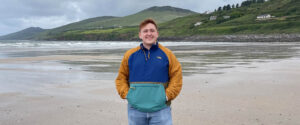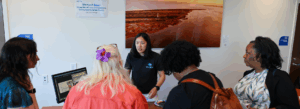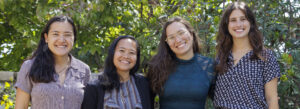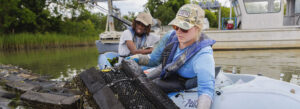Knauss fellow charts new waters in science policy
Fish cross into international waters constantly, but for the scientists who study them, international boundaries are not as easy to cross. Managing the ocean’s resources is one area where international collaboration is important for science policy.
As a Knauss Fellow in the Office of Science and Technology in the National Marine Fisheries Service (NMFS), Marla Valentine has helped her host office explore how international science policies impacts United States researchers.
Balancing the benefits and bottlenecks of regulation
When most people think of marine resources, they think of the animals and plants living in the ocean. But there’s another resource that’s being discussed by the United Nations: genetic resources on the open seas.
“We’ve spent quite a lot of time researching this topic and discussing it with our other nations that we collaborate with,” Valentine said.
Advanced techniques with remotely operated vehicles and genetic sequencing have resulted in many marine genetic discoveries in recent years. This caused a discovery boom of valuable genetic discoveries for manufactured products, since researchers could obtain and analyze DNA that was previously inaccessible.
Although no laws deal with genetic discoveries on the open seas, research within the territorial waters of any country requires an application process. Similar processes exist for scientific discoveries on land.
“You can’t go to, say, Brazil and discover a new species and try to patent some drug from it,” Valentine said. “That’s pretty well-regulated now under what’s called the Nagoya Protocol.”
The Nagoya Protocol, a U.N. pact, prevents removal of biological resources like DNA from a nation’s habitats without proper permission or compensation. But on the high seas—roughly 47 percent of the world’s oceans—there are no international laws that control ownership of genetic discoveries. Now, the U.N. is in the process of deciding whether to apply the Nagoya Protocol to the high seas.
Right now, genetic discoveries made in the high seas can be patented on a first-come, first-serve basis. Applying the Nagoya Protocol to genetic discoveries on the high seas—which are global waters—would create a benefit-sharing system where royalties from a patent would go back into a global fund.
“Many scientists find that the protocol is very restrictive, so they feel like that will bottleneck science,” Valentine said.
Valentine has been meeting with researchers involved in international projects to see how their work will be affected by the U.N. decisions, and how their research will change after a decision is made. In August, the United Nations concluded a third negotiation about marine genetic resources, and will begin a fourth negotiation in early 2020.
“The fellowship has really opened my eyes as to how the science and the data that’s collected in the field gets translated into actions that affect anyone working in the field, and how policies and laws are written.”
Valentine has been meeting with researchers involved in international projects to see how their work will be affected by the U.N. decisions, and how their research will change after a decision is made.
Sharing science on the international stage
As part of her Knauss Fellowship, Valentine attended NOAA delegations to Canada and Norway, where agency representatives discussed scientific topics of interest for both countries, like the U.N. decision on marine genetic resources.
For countries like Canada, the delegates discuss topics like the fish populations that cross through Canadian and U.S. waters, which require coordination to survey and protect. In countries like Norway, which share fewer fishing interests with the U.S., delegations can share technology and information.
“In Norway, they have really cutting-edge aquaculture, and that’s something we’re trying to develop as part of the United States’ blue economy,” Valentine said. “So, we work with them to develop techniques and methods that we can bring to the U.S. for people who are interested in developing their own aquaculture businesses.”
Valentine has also prepared briefing documents to get leaders up to speed on the topics discussed at international meetings. Writing these briefings often requires discussions with scientists and policymakers to learn about U.S. positions and other nations’ stances for topics like fish harvests or marine mammal management.
“We spend quite a bit of time making sure that anything we do internationally fulfills domestic needs and priorities,” Valentine said. “That takes quite a lot of discussion and thinking to make sure that we’re doing the best we can for U.S. priorities.”
During the remainder of her fellowship, Valentine will assist with the development of an international fisheries science strategy. For this plan, Valentine will coordinate meetings with researchers working on international projects at six regional science centers, all the way up to senior leadership. The plan will align international priorities with the U.S. regional and national goals for fishery science in the next few years.
“We’re really interested in advanced technologies and genetic techniques that can improve our stock assessment methods, so things from using gliders and sail drones to environmental DNA, which is a hot topic right now,” Valentine said.
A broader perspective on marine ecosystems
Valentine said her work in the NMFS Office of Science and Technology has broadened her perspective on marine conservation. She studied coastal ecosystems in the Florida Keys as a Ph.D. student at Old Dominion University, and worked in marine research labs from Alabama to Alaska.
So far, Valentine’s fellowship experiences emphasized the ways ecosystems matter for local economies, environmental justice—beyond their scientific value.
“I came into this sort of as a science purist, and the policy world was quite alien to me,” Valentine said. “The fellowship has really opened my eyes as to how the science and the data that’s collected in the field gets translated into actions that affect anyone working in the field, and how policies and laws are written.”
Takeaways:
- Marla Valentine’s Knauss Fellowship with the Office of Science and Technology in NMFS immersed her in science policy at the national and international level.
- After studying coastal ecosystems during her Ph.D., Valentine’s fellowship has broadened her perspective on marine conservation.
- The Knauss Fellowship has allowed Valentine to participate in international science delegations, prepare briefings for agency leadership, and discuss how potential policies would affect U.S. scientists.
Photos provided by Marla Valentine
Story by Madeleine Jepsen | Virginia Sea Grant
Published Dec. 7, 2019.
Valentine attended NOAA delegations to Canada and Norway, where agency representatives discussed scientific topics of interest for both countries, like the U.N. decision on marine genetic resources.





